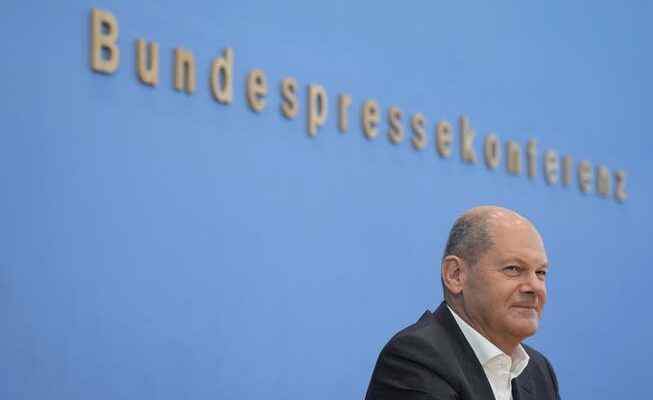The German chancellor supports the tax cut plans of the liberal Finance Minister Christian Lindner. Scholz is short on questions about the Hamburg Cum-Ex affair.
Not a philosopher of history: Olaf Scholz on Thursday in Berlin.
The summer press conference of the German Federal Chancellor is now one of the fixed dates in the course of the year in Berlin’s political life. It does not appear that the head of government would have to ask himself particularly tough questions; the occasion is more like a chat on a larger scale. That was the case with Angela Merkel, who usually returned from the Bayreuth Festival at this time of year, and with Olaf Scholz, who had just ended his vacation in the Allgäu, it was no different on Thursday.
The social democrat’s tour d’horizon focused on domestic politics, which came as a bit of a surprise given the war in Ukraine; unsurprisingly, its effects on the everyday life of Germans played a dominant role.
Scholz once again presented himself as a far-sighted statesman who is leading the Federal Republic through difficult times with a steady hand; so he tried to take away his countrymen’s fear of the coming winter. The chancellor held out the prospect of a further relief package for the citizens in the autumn. Despite rising energy prices, he does not fear for social peace.
The chancellor sides with the FDP
Scholz also attributed problems, which now mainly exist with the energy supply, to the failures of the previous government under Angela Merkel, in which he himself sat at the cabinet table as vice chancellor. “I like to talk to her on the phone, but now I also like being chancellor,” he said, describing his relationship with Merkel.
In the discussion about possible tax cuts, the chancellor supported the liberal Finance Minister Christian Lindner, who is planning such. Scholz, on the other hand, rejected a so-called excess profit tax for mineral oil companies, as demanded by the Green coalition partner.
Lindner’s intention to compensate for the cold progression was approved by the Chancellor: “Federal Minister Olaf Scholz has twice compensated for the cold progression,” said Scholz, referring to his own time as finance minister under Merkel. Consequently, this “cannot be an obviously wrong idea”. The chancellor should not only meet with the approval of his social democratic party colleagues.
The cum-ex affair about the Hamburg Warburg Bank was also discussed. Scholz has had to grapple with the question of how much he, as Hamburg mayor, knew about the illegal tax privileges given to the private bank by the tax authorities of the northern German city-state for years without suffering any serious political damage as a result. After it became known last week that there were more than 200,000 euros in a locker belonging to the former Hamburg SPD member of the Bundestag Johannes Kahrs, the Cum-Ex affair has received new explosiveness.
He didn’t know anything about the locker and hadn’t had any contact with Kahrs for a long time, said Scholz. Incidentally, the investigations had already been running for two and a half years; Meanwhile, it is clear that the Hamburg tax authorities have not been influenced by politics. The questioners were satisfied with this answer.
When exchanging rings, he gives Poland the buck
Foreign policy only played a marginal role. When asked by a Polish journalist when the planned exchange of rings between Germany and Poland would finally take place, Scholz answered evasively. In the exchange of rings, Germany wants to deliver modern weapons to Poland, so that Poland can in turn hand over equipment to Ukraine. For some time now, Warsaw has been accusing Berlin of not fulfilling its promises in this regard. An understanding with Poland is possible “if it is desired,” said Scholz, indirectly passing the buck to Warsaw.
Overall, Scholz mastered the press conference confidently, although the journalists present did not make it too difficult for him. One even gave the Chancellor the opportunity to try his hand as a philosopher of history: Scholz is in charge of a “progressive coalition”. How has his own concept of progress changed since the Russian invasion of Ukraine? Scholz turned down the offer: instead of philosophizing, he preferred to speak of technological modernization. The chancellor stayed on safe ground at all times this Thursday.
